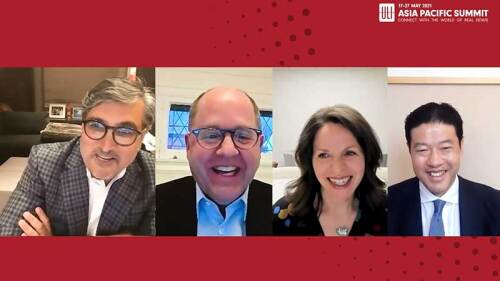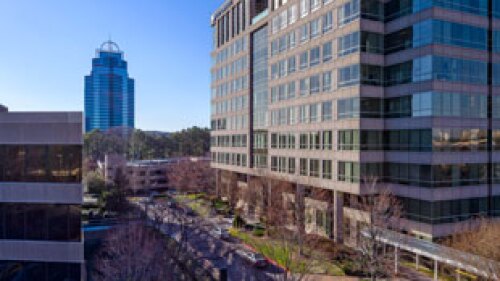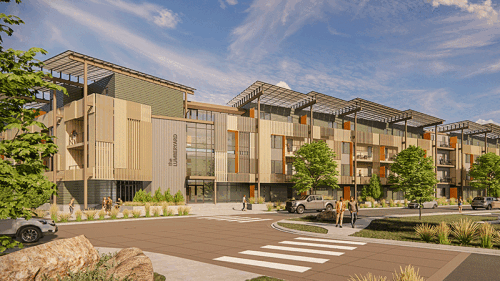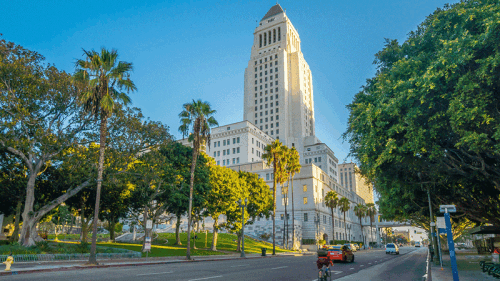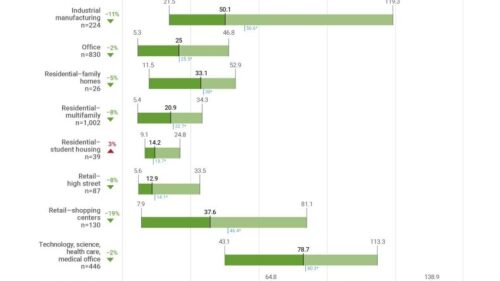Topics
Capital Markets and Finance
The 2021 ULI Asia Pacific Summit brought together a panel of investors and managers with nearly $500 billion of owned or managed real estate to discuss the importance of environment, social, and governance (ESG) standards to the industry.
Real estate economists predict markedly improved U.S. economic and property market conditions over the next three years, 2021 to 2023, compared with the forecast of six months ago, according to the spring ULI Real Estate Economic Forecast.
In a 2021 ULI Virtual Spring Meeting session, participants from different parts of the United States discussed what it takes for stakeholders to achieve a triple bottom line in real estate development, and what they see in the years ahead for the industry.
Design & Planning
Launched in fall 2020, Delve is an evaluation tool that uses artificial intelligence, Geographic Information System, and user input to optimize real estate development by Sidewalk Lab. Currently available on an engagement model, Delve pairs users with a team of consultants to generate highest and best use design options and help find design solutions for the nuances of complex projects. An updated version will be released later this year.
Atlanta has a deluge of existing 1980s, 1990s and 2000s-vintage office space, and there’s an opportunity to make these buildings more efficient and better for the environment.
ULI and Hines, the global real estate firm, have announced details about the finalist teams and the jury for the third annual ULI Hines Student Competition – Europe. Six multidisciplinary teams have been selected from a range of applications from across Europe to participate in this prestigious student competition for integrated and multidisciplinary urban regeneration. The teams have been drawn from an eclectic mix of universities, business schools, and other education establishments to encourage diversity in the real estate sector.
Development and Construction
Resort communities are appealing places to live year round, with stunning natural beauty and recreational opportunities in abundance. However, the same factors that make these places attractive can make them difficult for locals.
To be successful and sustainable, fighting homelessness in Los Angeles requires crisis intervention on two fronts: First, we must build more permanent housing and much more of it needs to be affordable. Second, we must build more transitional shelter of every type—more quickly and much, much more affordably. But shelter is not enough.
Affordable housing in California has become increasingly difficult to develop in recent years in a state where there is a significant lack of it. Two developers speak to the barriers to development in Southern California.
Resilience and Sustainability
Despite economic and political uncertainties, a host of market pressures—such as growing connections between sustainability and financial performance, increasing regulations, extreme weather events, and the importance of health and social equity—are driving real estate companies to prioritize sustainability like never before.
Experts speaking in December at a panel discussion at the COP28 climate summit in Dubai pointed to two ways in which the industry is already improving its environmental performance: first, by renovating more, and second, by using building materials with more recycled content.
Each year since 2009, ULI Greenprint members have reported their asset-level operational energy, water, waste, and carbon performance data to be included in the State of Greenreport. For the first time this year, ULI Greenprint piloted the voluntary submission of embodied carbon data from recent development projects to State of Green, Volume 14. This data is an important step in encouraging real estate to measure and reduce its embodied carbon emissions as the industry progresses toward net zero.
Issues and Trends
Third edition evaluates top 30 global powerhouses report reveals world’s leading urban hubs rise in popularity post pandemic. Challenges include new economic conditions, rising costs, adaptation to hybrid work, innovation gaps, the climate imperative, and transition to social, mixed-use districts.
Guy Kawasaki—chief evangelist at Canva, former chief evangelist for Apple, and bestselling author—summed up insights gleaned from his years in tech and as host of the Remarkable People podcast, interviewing such luminaries as Margaret Atwood, Tony Fauci, Jane Goodall, and Steve Wozniak.
As congregations across North America grapple with shrinking membership and aging facilities, a new opportunity is emerging: transforming faith-owned land into affordable housing and community-serving spaces. At the 2025 ULI Fall Meeting in San Francisco, panelists in the session “Spiritual Brownfields: Declining Congregations and Opportunities for Housing on Faith-Owned Land” explored how churches and developers are partnering to bring mission-driven housing to underused sacred sites.

